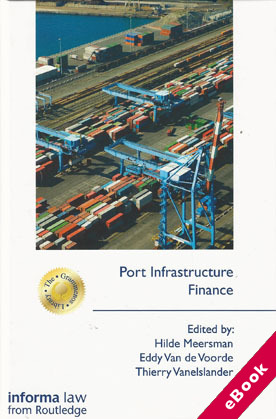
The device(s) you use to access the eBook content must be authorized with an Adobe ID before you download the product otherwise it will fail to register correctly.
For further information see https://www.wildy.com/ebook-formats
Once the order is confirmed an automated e-mail will be sent to you to allow you to download the eBook.
All eBooks are supplied firm sale and cannot be returned. If you believe there is a fault with your eBook then contact us on ebooks@wildy.com and we will help in resolving the issue. This does not affect your statutory rights.
This book proposes alternative strategies for financing port infrastructure, in a time when governments and port authorities can no longer guarantee sufficient financial input.
All major ports in the world have a continuous need for important port infrastructure investments. The national/regional governments and the local port authorities can no longer guarantee sufficient financial input and hence, alternative ways of financing and investing in port infrastructure are needed. Not investing in port infrastructure means a deterioration of the competitive position of ports and of the port related logistics sector.
The book gives insights into 10 areas related to port infrastructure finance. First, a delineation is given of what elements port infrastructure comprises. Second, a look is taken at the future demand for port infrastructure, by means of forecasting. Third, public-private partnerships, as one of the means of providing the necessary funding, are analysed. Fourth, the consequences of continuing privatisation on port investment financing are assessed. Fifth and complementarily, the changed role of port authorities and their impact on access to capital is dealt with. Sixth, the options of raising funds from capital markets are analysed.
In relation to that the changed role of private banks is considered in detail in Chapter seven. Chapters eight and nine are regional case studies, the former focusing on the US, the latter on Asia. The tenth contribution deals with the potential strategies for different actors.
This book will be of great interest to all parties involved in the port and maritime business, as well as investment companies, banks and other finaincial institutions involved in infrastructure investment.